Listen above or: iTunes / Spotify (Tap the subscribe button – it’s free and keeps you updated!)
Today’s Guest
Dr. Conor Brady – Canine Nutritionist
I’m so excited to introduce to you today’s guest, Dr. Conor Brady, a canine nutritionist that specializes in the benefits of raw food diets for dogs!
Dr. Brady’s interest in raw food diets began after moving to Perth Australia to work at an incredible guide dog organization. At the time, raw food diets were all the rage in Perth, a complete 180 from what was popular in his native country, Ireland.
During his time in Perth, Dr. Conor was given the opportunity to transform the lives of the dogs he worked with while switching them to raw diets instead of processed foods. The work he did within rescue organizations and the research he put into the benefits of raw diets for dogs is incredible.
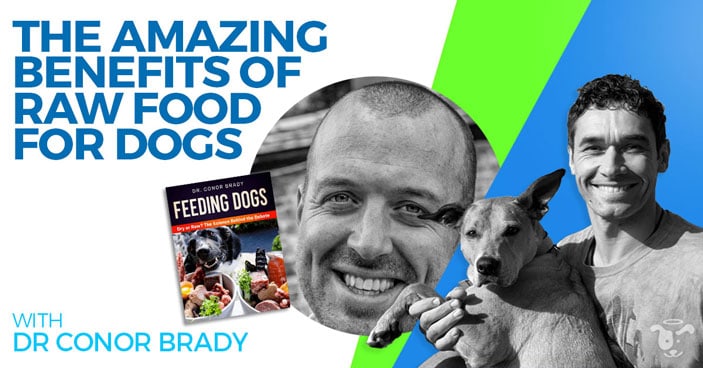
If you have any interest in the science behind what makes a healthy diet for a dog and how to begin the process of feeding your own dog raw foods, this podcast was made for you!
From science backed information to heartwarming stories of Dr. Brady’s time working with rescue organizations, this is a podcast you won’t want to miss!
You’ll Hear About
- [01:00] Who is Dr. Conor Brady
- [02:00] How Dr. Brady Became Immersed in Raw Diets for Dogs
- [03:00] Dr. Brady’s Raw Food Experiment
- [06:30] How Raw Food Saved Rescue Organizations Billions of Dollars
- [09:30] What’s Inside Dr. Brady’s Raw Food Diet
- [13:30] Primary Concerns with Processed Dog Foods
- [17:30] Feeding Dogs: Dr. Brady’s Science Based Book
- [23:30] The Scary Truth Behind Early Dog Deaths
- [30:30] Why Dogs are 10x More Likely to Get Cancer than Humans
- [36:30] Should Your Dog Eat Plant Matter?
- [39:30] How to Access Dr. Brady’s Book, Research, and Other Info
How You Can Get Involved:
Buy Dr. Conor’s latest book, “Feeding Dogs”:
Get started feeding raw with Dr. Conor’s YouTube series:
Links & Resources
- Website: https://dogsfirst.ie
- Facebook: https://www.facebook.com/DogsFirstIreland/
- In the podcast we talked about a Ted Talk…here's the link to that Ted Talk: https://www.youtube.com/watch?v=uNDWvejza4c&t=4s
- Here's the follow-on scandal TWO YEARS LATER: https://www.abc.net.au/news/2018-04-30/popular-dog-food-suspected-of-making-dogs-sick-advance-dermocare/9699866
Learn more by tuning into the podcast!
Thanks for listening—and again, don’t forget to subscribe to the show on iTunes / Spotify to get automatic updates.
Cheers,

~Doggy Dan
|
Voiceover: |
Welcome to the Doggy Dan podcast show, helping you unleash the greatness within your dog.
|
|
Doggy Dan:
[00:00:30] |
Hello and welcome, everybody, to another Doggy Dan podcast, and today I have Dr. Connor Brady from Dublin, Ireland with us, and he's going to talk to us about nutrition and dogs' general health and the fascinating dark underbelly of dog food. How are you? Good to have you here. |
|
Dr. Conor Brady: |
I'm good. I'm good, Dan. Yeah, I'm raring to go absolutely, so thanks for having me on. Appreciate the opportunity. |
|
Doggy Dan: |
We've already had a bit of a laugh, so this is going to be fun. I'm looking forward to it. |
|
Dr. Conor Brady: |
Absolutely. |
|
Doggy Dan: |
So first question, tell us a little bit about yourself. Who on earth are you for people who've never heard of you, and what do you do? |
|
[00:01:00] Dr. Conor Brady:
[00:01:30] |
So, my name's Connor, and I'm from Wicklow, Ireland here. This is kind of a Dublin accent that everyone can hear, and I do a lot of canine nutrition. I'm one of the kind of canine nutrition lads over this end of the world. So my background also is in... I grew up in the dog shelters, and that kind of thing. So I've been mad about dogs as a kid, but I went through colleges as well as a degree, got a doctorate studying the effects of nutrition on behavior, and that was the kind of start of the love bug for nutrition. And then I joined Guide Dogs as a pup supervisor. 9:00 to 5:00 puppy immersion, it doesn't get better than that as you can appreciate, Dan. Making a living from working with dogs, it's a treat. So that's what I had, and then suddenly, there was an opportunity over in Perth, Western Australia, and I thought, "Well, training dogs in the sunshine is a hell of a lot better than training them in the lash and rain at home, so I thought, "Maybe I'll take a trip over with the wife."
|
|
[00:02:00]
[00:02:30] |
So, we're over in Perth for a while, and that's where I really encountered... I was already doing nutrition stuff, but it was when I bumped into the Aussies, they were really the first to the whole fresh raw real food movement in dogs. There was a huge portion of the population were already doing it, compared to anywhere else I'd been. They were all talking about it, and that kind of thing. So I had a good few sick dogs. You'd start doing a bit of training on the side as you do to supplement your income, and it's easy to do. I remember counting of the 18 dogs I had, I think seven of them were on non-steroidal anti-inflammatories. I mean, this is crazy. Could you imagine having a classroom of 18 kids and seven of them are on non-steroidal anti-inflammatories for some for random allergies? And Australia has the most dangerous everything, so it makes sense that it's pollen is vicious. So I just thought, "Okay. Well, maybe it's just crazy epidemic of itch."
|
|
[00:03:00]
[00:03:30] |
And that's really I started rooting around, and I made a few changes to their diet, took them off dry food, put them on raw. They got really better, and the usual kind of story you'll hear from people, but it was the fact that I said to my superiors, "Look what I did with a couple of dogs, and it might make sense that we try this with our own dogs." It was the fact that they didn't really leap with me, and they didn't really kind of get it, and that kind of annoyed me. And then I couldn't convince the vets at all to come with me, and that really annoyed me. I kind of said, "Well, look. I've done a little experiment here. Why don't you have a look at some of the worst dogs on your books and you take them off ultra-processed food?" Some of the dogs were recurring gut issues just as a starter. I mean, gut issues, food. Give it a whirl, but they wouldn't. So, I didn't like that stonewalling that I felt I was being... I don't like not being listened to. It's kind of like...
|
|
[00:04:00]
[00:04:30] |
Really, then I start rooting around trying to make friends and you do. You have Ian Billinghurst, Dr. Ian Billinghurst, Lonsdale. Those two are the two top vets. The Raw Fathers, they call them. Both of them are Aussies. And you get chatting to them, and then you meet Brisbane Guide Dogs. And this is a pretty interesting story. One of the revelations in the book really was meeting this CEO Chris Laine, and she was just an amazing woman, amazing CEO. And in 2009, Chris... It's actually documented in the Courier Mail if people want to check out the article online, a journalist interviewed her. But the Chris kind of decided one day, "There might be something to this raw thing." They've got 180 dogs in training, and she did a little experiment. She was encouraged by what she saw, so she changed the whole population over from... 180 training dogs from dry to raw dog food. That's a big leap. That's a big leap.
|
|
Doggy Dan: |
Yeah, that's a good sample size.
|
|
Dr. Conor Brady:
[00:05:00] |
It's a good sample size, and it takes balls to do something like that. It's not an easy thing to do. So, she makes the change and then you start hearing that... I saw the Courier Mail piece and reports of veterinary bills plummeting. And the four or five things I remember that were leaping off the page were recurring skin conditions, recurring gut conditions, recurring ear conditions, orthopedic surgery and consults. They were the four or five topics, or headlines I saw, and they were plummeting. And the figure was something like $80,000 savings in a year. Now, for charity organization, that's a staggering figure because every penny is hard-earned when you're a charity. So, if you can save that sort of money, can you imagine what you could do if you could put a lot more paws on the ground helping people? So, that was a staggering figure.
|
|
[00:05:30]
[00:06:00] |
And there were lots of other small things when you're talking to people in the organization, the kennels are quiet, the poo doesn't smell, the dogs were way more focused. Not less silly. They're Labrador pups, and they're jumping around, they're doing with pups do. Or Labrador cross Retriever is what they is, and it didn't change that sort of their behavior, but they were better able for the training, which was something that a lot of training organizations were repeating already. So, that really hooked me and I took that information back, and I said, "Guys, look what Brisbane Guide Dogs are doing. We got to do this," and they weren't going to come on side, so I kind of knew my time with Guide Dogs was up because I said, "Look, if these aren't going to change, there's something seriously wrong that people can't see this, and there's no vets coming on board."
|
|
[00:06:30] |
What was interesting was what happened really to Chris Laine. She saw the change it made in their dogs, they thought, "You know what? If we stuck the Brisbane Guide Dogs badge on some raw dog food, sure we could sell this food on the market. Loads of people would buy it. Everyone wants to support their guide dog organization, and if the food's good enough for guide dogs, you can be pretty sure the rest of the public are going to buy it." So they developed this range called Leading RAW dog food, and it took off and it was a top seller, and they started dominating. Now, raw pet food, people don't understand what sort of business it is. There's more money in pet food than there is in the music industry. There's more money in dog food alone in the UK. It's a £1.1 billion a year in the UK alone, and the music industry for selling music is one billion a year. When you add in cats and treats, it's twice the size of the music industry. And the margins are colossal. So it's a big, big business.
|
|
[00:07:00]
[00:07:30] |
So, when you're selling the top product in Australia, you're not talking to more money for charity organization, and suddenly, you can use that resources to do good stuff. It was on the up for Brisbane Guide Dogs, and then suddenly, 2015 I hear Chris Laine is fired, out the door, and in comes a new CEO. And I have her words there in my book, which I probably should be quoting, but I don't have the page open to hand, but words to the effect of she believes she was let go because the CEO that came into replace her was going to bring back in the pet food range that all those organizations are sponsored by.
|
|
[00:08:00] |
That was the start of the darkness for me, and I thought, "Whoa." I mean, these are healthy dogs. These are proven to be healthier on this food, although there's a whole lot of stats behind it that I can use here because I do [inaudible 00:07:47] my paper in some way. So, that implies that if you change them back, they will be less healthy, and that really bothers me to this day. It's kind of like could you imagine for the people working in the kennels, the people training those dogs, Dan? Could you imagine if it was your dog and you thought somebody was going to do something that was going to make him less healthy, and it wasn't going to be you, it was somebody else? I mean, that's-
|
|
Doggy Dan: |
It crosses a line, doesn't it?
|
|
Dr. Conor Brady:
[00:08:30] |
Yeah, it does. It's kind of like messing with me kid. Anyway, that was a start of it, and then I kind of hit the road and I started doing a few seminars and visiting vet university libraries and looking at what the vets were learning and checking out the top books that they use and trying to talk to some vets. Murdoch University, they're in Perth. It's one of the biggest veteran universities in the southern hemisphere. So I thought, "I'm going to meet some serious nutrition heads in here," and there's just very little for me to talk to and I kind of thought, "Well, where are they? Where are these people that can talk to?" And it turns out there's only about 100 veterinary nutritionist and vets that have studied nutrition in the world.
|
|
[00:09:00] |
And it's like, "Okay." I needed to do something about this. I started learning more about it and then I developed a pet food. I came back to Ireland then, and that was the start of things. I developed a pet food range myself for a couple of years. I thought I could lure in maybe a guide dog organization here. That didn't really happen, but it took off. It worked a little bit, but manufacturing is hard work and I don't-
|
|
Doggy Dan: |
What was the gist of your food, Conor? What was in?
|
|
Dr. Conor Brady:
[00:09:30] |
I think raw dog food, they wrap it up in many different ways. Some companies are brilliant at marketing, but at the end of the day, like cereal-based pet food, it's all quite similar, okay? It could all come out at the same factory and you wouldn't know. They just changed the label. So, raw dog food is based on this premise that dogs eat rats, rabbits, that kind of stuff. They might need a bit of plant material. We can get to that later, but I do diet studies. That's where I'm really strong, and they do probably eat a little bit of plant material, but for the large part, left to their own devices, the study show dogs eat predominantly meat and bone and they eat anything. They will eat any frogs, and they'll eat mice, rats.
|
|
Doggy Dan: |
This is dogs in the wild you're talking about, is that right?
|
|
[00:10:00] Dr. Conor Brady:
[00:10:30] |
Dogs in the wild, free-to-roam dogs, even dogs that live with families at nighttime, we call them village dogs or free-roaming dogs, so not truly feral. Even those will just suddenly eat meat when they're left to their own devices. But there is a very strange quirk in dogs which fudges the whole debate, because if you have a dog or a cat when they're very young, and you feed let's say a cat, because we all know cats are total carnivores, but when you feed a cat a bit of broccoli when it's a kitten... You'll see videos online of cats chewing broccoli. Now, that is a completely strange thing to see because cat are obligate carnivores. They absolutely don't eat vegetable material, but here we have on YouTube videos and videos of domestic cats eating it. How come? Because this stuff was fed to them when they were babies.
|
|
[00:11:00] |
And as you know, Dan, within training, there's a period in the dog's life and the pup's life we call the imprinting period. Maybe the name has changed in the 15 years since I've trained, but that first four or five months for socialization is just everything in a dog's life. They say you can't teach an old dog new tricks. Of course, you can. I mean, you're doing it every day, but in the first four or five months in guide dogs, it's really important that the dog gets exposed many times in a positive way to say, a bus or a train, because a bus is terrifying, air brakes in the face and all this horrible smell and heaters under the seats, and rubbish and chewing gum and everything. Once the pup has been on the bus four or five times, they're okay with it, but the same applies to food.
|
|
[00:11:30] |
If you want the dog to have a varied diet and enjoy eating some funny textures like chicken breast meat, if they've never had that before and then suddenly you give a chicken breast to a dog that's a year or two old or 10 years old, they'll look at and they might have a face on them like a dog chewing a tomato, that face of, "Jesus, I want it." Excuse me. "I want to eat this, but it's a funny texture. What is it?" This kind of thing can be developed in dogs that tastes... You can actually spray apple in the air of pregnant females, and the pups will come out and fight over the apple-tainted nipples. That's how sensitive your environments are to absorbing proteins, and you come out looking for the stuff your mom ate, which-
|
|
[00:12:00] Doggy Dan: |
So basically, what you're saying is you can get a dog to learn to enjoy things like broccoli, but it's not necessarily good for the dogs?
|
|
Dr. Conor Brady:
[00:12:30] |
Exactly. Yeah, that's exactly right. And then it fudges the diet studies because you have... Most of the diet studies come from dogs that are free-roaming, so they're not feral dogs. You don't see them very often. Free-roaming dogs are studies of populations of dogs that populate dumps in poorer parts of Italy, Zimbabwe, Brazil. That's where the diet studies are coming from. But those dogs return to their humans at nighttime, to their villages at nighttime, and they're fed scraps of plant material. Poorer people don't waste meat material on dogs. They get fed the plant material. So, when you do diet studies of these, they have a bit more plant material.
|
|
[00:13:00] |
Anyway, to come back to your initial question, Dan, you asked me what my food was on. My food would be on the premise that you'd feed this ratio of 8-1-1. In other words, lots of meat, a bit of bone, and a bit of organ meat, which is liver, heart and kidney, and that's really the basics because you can make a duck variety of that, which is essentially duck with duck heart and liver, and you can make turkey, chicken, beef, whatever. So I brought out two or three of these ranges to the Irish market, and slowly started convincing the Irish Republic, who are not ready for it at all, I have to say. I did leap a little bit too soon, and I slowly brought a good few of them over to raw dog food.
|
|
Doggy Dan:
[00:13:30] |
What's your primary concern with the main manufacturers of traditional old-school dog food? What's going on there, just for people who don't really know. I mean, there's obviously a mix of different types of food. There's really good dry dog food, is it all bad, or what's your take on the dog food and dry food?
|
|
Dr. Conor Brady:
[00:14:00]
[00:14:30] |
Yeah, I think there's probably a ladder of good, the ladder of goodness, and I would say down the very bottom, down the very bottom of that ladder at step one is cereal-based pet food. It doesn't matter if you're telling me it's wheat, corn, rice. If a contains 50, 60% ultra-vastly digested carbohydrates, your dog's in trouble. He's eating that very high starch, which is a high sugar diet. People believe that spaghetti isn't sugar. Spaghetti is almost sugar to the body. It's one tiny, digestive step away. So if you eat a lot of spaghetti, you are eating the equivalent of a very high sugar diet. It's this whole glycemic index. The slower-to-digest food, the better for you. When dogs are eating rapidly digested pellets made on 50, 60% of wheat corn, I'd say they're not made with the dog's interests at heart, they're made with the bottom line at heart. That's not what dogs eat. I mean, you wouldn't be in 50, 60% wheat or corn to a human. Although, some nations are trying and look at the state of them. So, it's just not a healthy way to eat.
|
|
[00:15:00] |
We're supposed to eat maybe at most 30% very complex carbohydrates, good bit of fiber in there, then your whole grains and your strange grains that come from South American stuff. They're the sort of tough kind of hard-to-digest, slow-to-digest grains you should be eating at a maximum 30% of your diet, and here's a meat-eater that's being fed ultra- processed food. We know ultra-processed food is the whole cause of the obesity epidemic, and if you've got an obesity epidemic, you've got diabetes, cancer, pancreatitis in dogs, and all these other things that go with eating too much carbohydrates. So, the very first thing is when you ask me, "What's good food?" I'd say, "Well, any food very high in carbohydrates. It doesn't matter what you call it, it's no good for the dog." Step one is your cereal-based pet food, then you go up a bit, grain-free is generally a bit better because they go a bit more natural, they drop some of the nasty chemicals.
|
|
[00:15:30]
[00:16:00] |
They don't list any of the chemicals in the back of the pack, and they try to use a bit more real meat, less of the meat meal, which is a shocking ingredient. It's the lowest of the lowest. The dregs of the rendering industry from meat waste. Why would you feed that? Why would you pay good money for that? And then you go up from grain-free, and you go to slightly higher meat-containing foods, and some companies mean well and so they give the dogs more meat in the pellet. So, you might have these products called 80-20, which is 80% meat, but I would say that's 80% cooked meat or ultra-processed meats, and ultra-processed meat probably isn't the most good friendly thing you need to be eating. Your dog wants it fresh and easy to digest and really good quality.
|
|
|
They all mean well. Then there's all sorts of things like dehydrated pet food cold-pressed, which means they tried to use less heat and stuff, which is great. But then you get up to the better foods, which are starting to use real ingredients, cooked foods or home cooked foods. People wrap that up in number of ways, which is great because they use real ingredients. You can see them in the bowl. And then you get up to your raw dog foods and stuff, and to some really good... But probably the best you could do is make it yourself. It's just that people are afraid.
|
|
[00:16:30] Doggy Dan: |
For people who are going, "I'm interested. Some of this is making sense. There's a lot of information." You've written a book. Tell us about your book. I'm basically just wanting to help the listeners who are thinking, "I want to know more about this." Tell us a little bit about the places maybe your book, your website? How can people find out more? We're not coming to the end of the podcast, guys. Don't get worried. I'm just thinking it feels like a good point to chat a little.
|
|
[00:17:00] Dr. Conor Brady:
[00:17:30] |
Yeah. No, and you're right, Dan, because when people hear this initially, it's quite a lot. And so if you get bombarded with a lot, you tend to go a bit inactive. You don't leap at it. Simple messages are build that wall. Three word messages, we love them. And the more complex the message, the scarier it is, and that's not on site. So, I get all that. I think a good place to start is of course my website, but I would say that. You can go to my website, dogsfirst.ie. D-O-G-S-F-I-R-S-T.ie, and I've got lots of articles there, all the raw FAQs that you're going to ask me, and all the health issues. There are solution to health issues for free on the website because I want people to have the diets, to have them for cancer and kidney disease and stuff that's all rife in dogs. So dogsfirst.ie is a good place to start, but as you kindly plugged there, I do have a book that's doing well now, and that's called Feeding Dogs, which you'll find online. It's probably Amazon if you're in New Zealand.
|
|
Doggy Dan: |
And I had a look at the book, and it's getting some incredible reviews.
|
|
[00:18:00] Dr. Conor Brady: |
It's going down well, thank God. Yeah.
|
|
Doggy Dan: |
Hundreds of five star reviews. Tell us a little bit about the book. What's in it? Is it recipes? Is it your journey, your story? Is it behavior, or is it food?
|
|
Dr. Conor Brady:
[00:18:30]
[00:19:00] |
I'm into research. I'm an academic. So the whole point of this book, it's a monster, but the whole point of this book was to give science behind the debate because everybody kind of says, "Oh, I'd make the leap, but there's no science." The vets would say that. So, I brought out this book, which I tried to make it as legible as possible. I'm inspired by people like Bill Bryson, and I don't know, people that write science books that you want to pick up and read at the airport. That's what flicks my switch. I love those sorts of books, and so I wanted to take the most academic debates that people seem to be having behind closed doors, and I'd bring them out and write them hopefully in a way that people can pick up. It's no point writing something very complex because we know our GPs and vets aren't reading the journals and academic papers because if they did...
|
|
[00:19:30] |
I mean, one of the major things in the book... The book is divided into four sections, I'll get to that, but in the second section, when we're talking about dry dog food, the first section talks about what dogs eat and their digestive kind of physiology and that kind of stuff, and looking at the biology of the dog and ancestry, which is interesting because people always talk about, "Well, the dogs aren't wolves," and we go, "Yeah, okay. Fair enough, but the dog is very close to a dingo. I mean, a dingo 4000 years ago is your domestic dog. They're so close, they're interbreeding with each other. Wolves and dogs don't interbreed very much at all, but dingoes are happy to do it. Forget talking about the wolf. Look at the Dingo. The dingo's a domestic dog 4000 years ago."The Papua New Guinea dog, I've only just discovered and they're so identical to the dingo, it's ridiculous. And that's where they came from. There used to be land bridges there. But anyway. Total carnivore, the Dingo. Forget talking about the wolf."
|
|
[00:20:00]
[00:20:30] |
Look, that's the ancestry stuff, but the second section starts looking at dry dog food and highlighting many, many of the major issues, but it reveals one big, big thing. It's this statement, it's that there's not a single study in existence to suggest ultra-processed cereal-based pet food is better for a dog than normal food, not one study. So, the whole ethos of this thing, science and prescription pet food, which is a complete misnomer because there's no medicine in the product. You're not allowed to do that actually because if news agents can sell your product, it can't be under prescription. But anyway. So this whole idea of science and stuff, is there a basis? We have no evidence to say that real food is good for a dog, but look at all their science, but when you do look at their science, you realize it's just foundations of muck, of sound, because they've got a lot of studies, no doubt, but their studies of a group of dry-fed dogs compared to a group of dry-fed dogs.
|
|
[00:21:00]
[00:21:30] |
Let's say you wanted to study itch in dogs. You'd feed one group of dogs standard cereal-based pet food, that's going to keep them itching, and you feed the second group of dogs the exact same diet, but you add a cod liver oil tablet to their bowl. And after two weeks, you realize that this group B are itching slightly less because of the cod liver oil tablet. Well, now they wrapped that product up, put the cod liver oil in their usual standard pellet, and they wrap it up as magic dermal care skin benefit pet food, sell it to three times the price under a prescription. So, that's called an unfalsifiable comparison. We know adding cod liver oil or fish oil reduces steroid need and reduces itch in dogs, but is that really relevant is the question. So, those studies are nearly irrelevant because the question will be, "Why are the dogs itching? Why don't you just..."
|
|
[00:22:00] |
The idea would be a big group of dogs, like what Brisbane Guide Dogs did. A big group of dogs, and they have some of them on cereal-based pet food and the others on real food, biologically appropriate meals that are designed by people that understand what dogs eat, and then you compare those dogs after three or four or five years. Put them through fitness tests, get them pulling sleds. It's like if you're watching smokers. If you pitched 11 smokers against 11 non-smokers in football, in soccer, the first half might be pretty okay to watch. It's the second half where the non-smokers are going come up trumps. So, they're the studies we don't have. We have zero, not a single study.
|
|
[00:22:30] |
I love saying that when they say, "What studies have you got to prove raw's better than dry?" I say, "Well, here's a couple of head-to-heads that have been done in the last three years, but the deal is if I show you one, you show me one. So, I'll go first," and I show them one or two of the studies produced by Helsinki, who were bringing in lots of good studies, the University of Helsinki, and they don't have any. So, they'll switch the conversation very quickly to the dangers of raw dog food, and that's where we are.
|
|
Doggy Dan: [00:23:00] |
Yeah. As a behaviorist, I went around people's houses and I worked over the last decade. I've worked with about 3000 dogs in a one-on-one capacity.
|
|
Dr. Conor Brady: |
Bloody hell.
|
|
Doggy Dan:
[00:23:30] |
Yeah, it's just a lot of houses. It's a lot of time. I've sat down for hours with 3000 families and their dogs, and obviously, a lot of them talk about their pets which have passed and they tell me stories about, "We had a beautiful dog." And over the years, you chat to a lot of families who have lost pets at a very young age, and they talk about, "My dog died at six or seven or eight." And you think, "Well, this dog lived until it's 14 or 15." Now, I've always kind of inquired a little bit how did the dog die, and they say...
|
|
[00:24:00] |
And very often, I spotted a pattern of owners saying, "Oh. He died of kidney failure or ulcers," and I started asking them, "What did you feed the dog? What was he fed?" And I totally independently started to spot a pattern of a very specific, very well known, very large brand of dog food. And that name kept popping up. And after you see it 100 times, you go... And I actually used to say when people said, "My dog died very young. Actually, he had ulcers." I would say this name of the dog food. I said, "Did you feed him this?" And they'd go, "Yes. How do you know?"
|
|
Dr. Conor Brady: |
Yeah, that's scary. |
|
Doggy Dan: [00:24:30] |
And I didn't like to say it. Well, I did. I'd say, "Well, it's just a guess because I've heard of so many people who fed their dog this," and I chatted to a very [inaudible 00:24:32] vet, and he said, "Yep, that dog food has..." I don't know if it still has it, but he said, "It had," or at the time, "It has a preservative which has been banned from the human food chain for many, many decades because it's poisonous, it causes cancer and all sorts of illnesses," it really turned my stomach, and I went, "Wow."
|
|
[00:25:00] Dr. Conor Brady:
[00:25:30] |
I don't doubt it. Dan, I'll share with you afterwards, and if the listeners are interested, I've got this fantastic TED talk that was given by a vet in Lithuania. I can't remember the exact title, and you're going to need the exact title of find that, but it was something like I Blew the Whistle, and Now I'm Fighting For My Career, or Fighting... And I Lost My Job, something like that, and it was about the rise of megaesophagus in dogs. And if you want to see some dark stuff, talking about specific brands causing damage, this Lithuanian vet was a top microbiologist, I think she is. Top veterinary microbiologist, and she was flown back from the States to her homeland in Lithuania to investigate why there was such a spike in megaesophagus. Megaesophagus is these videos where you see dogs having to eat standing up because their throat doesn't have any musculature around us. They can't swallow anymore. They have to kind of glut their food down their neck, and they can choke on water. It kills 30% of dogs that get it, and the 70% of survivors because their pet owners are just superheroes.
|
|
[00:26:00]
[00:26:30] |
So, it's a very terrible disease that you can't get over, and they thought it was genetic up until there was a massive spike in it. Then they thought, "Well, something has to be causing this because genes don't suddenly cause huge increases," and this lady produced a couple of studies, and eventually narrowed it down to an exact brand of dry food. I'd love to say the name because she says it in the TED Talk, but I'm still reluctant to say it. So, I won't bother because people can see it on YouTube themselves. And anyway. The thing about it is... This is section three now in the book for the real dark stuff, the dark signs, the nonsense that goes on, the corporate, the shenanigans that go on.
|
|
[00:27:00] |
So, this was a nice little story to begin with because this vet, after kind of saying, "I need another 30,000 euros," was all she needed to do one more study, and then she'll be able to say exactly what in the dry food it was. It was a toxin or a parasite or whatever, and she already kind of knew what it was, but her Department of Agriculture came in and said, "We're shutting you down. Don't produce another word." Here's the thing, here's the rub: So, she got shut down, and her Department of Agriculture were happy enough to shut her down, and you start to see a money trail there, and she reveals that two years later... We hear nothing more about his product. Nothing happens. There's no recalls, though she's shut down for daring to suggest it was a brand.
|
|
[00:27:30] |
Two years later, Guide Dogs Sydney... Or no, Sydney police dogs, and six out of eight police dogs in the Sydney force came down with megaesophagus, and ABC News over there are very anti-kibble, and they come in very heavily and they said, "What's going on?" And they said, "Well, apparently it's this type of dry food they're feeding," and ABC News do a little bit of research and say, "It appears we've known this for two years. This brand was pointed out two years ago, and it's been sold for two more years. How many more dogs got megaesophagus?" So that shows that that stayed on the shelf. I mean, bloody hell.
|
|
Doggy Dan:
[00:28:00]
[00:28:30] |
I think the thing here for me is I've always been very aware of people's motives, and often it's money and power, and so when people become whistleblowers or when people put stuff up which goes against the grain, when people become truth seekers and say, "Hey, I'm going to look into this a little bit deeper," and there's no financial reward from them because the big organizations, the multinationals are all against this chain. I mean, it's like the pyramid or the structure that is currently in place, all the people who are at the top making tens of millions, hundreds of millions, they are in place because of the current structure. Now, when anybody at the bottom starts to rustle that structure, you got to realize the whole thing could collapse, and so they are really fighting against it, and they have to have such guts, such bravery, have to be so brave, and and the number of times... I've seen thousands and thousands of people who have become whistleblowers or told the truth or told their story and they've been shut down, lost their jobs.
|
|
Dr. Conor Brady: [00:29:00]
[00:29:30] |
No doubt. Oh, yeah. And you do see that. That's a fact. I mean, even when I went to release this book because there's over 1400 references in it, and every time you say something, you already have people waiting to get the book so they can just pull you apart online because that's just the way it is. I had to hire two barristers, two barristers that were experts in copyright to go through the book, the entire thing. Cost an absolute fortune to getting insurance. I live in a little bit of worry that at some day they come and squash me because, as I recount in the book, there's plenty of instances where they step in to squash you not because they think they can win. They probably won't win in court, but you will be so wrecked by the time you got there that your message will just be drowned out under all the stuff that you were fighting. So, that kind of stuff is kind of real and dark. Hasn't happened yet.
|
|
[00:30:00] |
In fact, there hasn't been a single dissenting voice to a single point I've made in the entire book, which is testament to the fact that if I was an absolute lunatic, surely some people will be coming up with some science of their own to say, "Well, carbohydrates aren't the cause of pancreatitis." Well, they are, I'm afraid. Unfortunately, you go in and your dog has pancreatitis and the vet will say, "Did you give me a bit of fat off your steak?" That's a real trumped- out line. And whose fault is it? It's your fault. It's like, "It's my fault because I gave a bit of fat to my dog, I gave a bit of sausage to my dog? Why couldn't my dog eat a bit of fat or a sausage?" So, this is the thing. If your dog is going to live on high carbohydrates, we have all the studies we need to show that eating high carbohydrate diets increases your blood fat. People just thought, "Well, if there's fat in the blood, it must be because you're eating fat." No, it's from eating carbohydrates that drives up blood fat.
|
|
[00:30:30]
[00:31:00] |
It's a type of process that happens. It's a strange thing. It's like during the obesity epidemic, they thought, "Eating fat must make you fat. I know! We'll make low fat food and high sugar." Boom. Obesity epidemic. Carbohydrates have a role to play in everything, cancer... Dogs are 10 times more likely to get cancer than humans. 10 times more likely. I don't use those words lightly, 10 times more likely. And everything's okay? Give me a break. So we've got quite twice the amount of vets per dog in the last 10 years, 20 years. We've got huge drug sales. We've got drug companies, pet drug companies floating on the stock exchange. It's a great market because people haven't a clue. They'll spend anything on them, and people are just getting done over. It's not right.
|
|
Doggy Dan:
[00:31:30] |
Yeah. Look, I hear your passion, Conor, and I felt it at the very start of this podcast when you talked about how you love working with the puppies, and you worked at a guide dog place and you worked in the rescue shelters. You feel like a brother in terms of loving the dogs, and it's not about the money, it's about you love these animals. They can't speak English. They can communicate with us, but it's very tricky for them to actually say... We hardly know sometimes what's causing our problems medically, so it's sometimes very hard for a human to know what food's causing it, but even if a dog does know, it's very hard for them to actually say, "This is causing..." So, I hear your passion and it is an absolute minefield out there.
|
|
[00:32:00] Dr. Conor Brady:
[00:32:30] |
It's quite sad. Do you know what? I'd like to say that at that point... You just reminded me of something. Just to highlight to people, not everyone's going to come along with this, and that's fair enough. We're just talking, but I think it's important to say that it's not the individual vet on the ground that your ire would be directed at. It's not them at all. As I say at the start of the section on what vets are learning in college nutritionally-wise, which is not a whole lot, that's the short of it, but what they do learn is taught inveritably by dry food companies, but the thing is that these are kids, our brightest kids going to university. It's harder in Ireland to be a vet than it is to be a human doctor. So, these are bright kids going in there, or at least kids are excellent at regurgitating facts in exams, and in they go to college and they work their asses off in college. Very difficult to a degree.
|
|
[00:33:00] |
I mean, GPs have to worry about... Or general practitioners, human doctors have to worry about one animal. Vets have to learn everything about every science, every ology you could think of, genetics and biology, physiology, anesthesiology, surgery in not just one animal, but every animal. That's cats, dogs, rodents, birds, fish, cows, and birds, all sort of stuff, and then after five years, they've got to learn to run a business and staff. It is a savage workload. They are highly stressed. They've got one of the highest suicide rates. And when they get into practice, they work their asses off. So really, these people aren't driving around in Porsches, and if they bloody did, they deserve it. I mean, if we're going to... Look at some jobs, they don't deserve the money they got.
|
|
[00:33:30]
[00:34:00] |
So, I will say that these kids get in with unbelievable work ethic. They're passionate. They love the animals, but they believe what they heard because they don't have time to believe otherwise. It's like, "Just give me the facts, and I take in the facts, and then I speak the facts," and that's what happens, and then after that comes in a huge amount of, sadly, ego and cognitive dissonance because I can't possibly be this wrong. I can't possibly believe... When you think about it, the suggestion that a candy company's product is the very best product. I mean, these are candy companies. These are companies with the world's worst nutritional backgrounds.
|
|
Doggy Dan:
[00:34:30] |
Here's the thing, Conor, if you actually take the comparison of what we've been doing with our children, feeding them fizzy pop, feeding them all chocolate bars, feeding them all really bad food and then look at their behavior in school, how they concentrate, they're not physically well, they're not healthy with these issues. It's exactly the same. Difference of course with children, they can always say, "Mum or Dad, I feel sick. Mum, I'm not happy." The dogs can't speak though, can they?
|
|
Dr. Conor Brady:
[00:35:00] |
That is a bit of the a problem. And I'm just making sure that people don't go... When they do realize what's going on here, and really, they're not to blame or to point the fingers at vets, but if they do figure. It's about bringing them along. It's interesting though this whole raw revolution, and it is happening. 20% of the UK market is feeding real food to their dogs, but it's happening from the ground up. As Jim Morrison said, they've got the guns, we've got the numbers. I'm in part of the Raw Feeding Veterinary Society. I'm the only non-vet in the group. There's only 120 vets in that group. It's a global organization. We are a tiny number of scientists and the vast number of scientists are against us, and yet the movement is happening. So, I should encourage people that you don't need to top echelons to do anything. You just need to speak with your feet and say, "I'm not picking up what you're putting down, buddy, and I'm just going to buy this food and make a leap myself do that."
|
|
[00:35:30]
[00:36:00] |
Do a little trial yourself. Try a bit of food yourself. A tin of sardines, crack an egg on top of the food, give them your leftovers. Give a nice meaty bone. Throw a handful of blueberries out into the dirt. That is a fantastic thing to be doing. If you've got a nosey little dog, any of your scenty dogs. I've got a Cocker Spaniel here who's just insane. Dan, I desperately need you. I don't say that lightly on air, but I do. My wife keeps saying, "Can we get a trainer in?" It's like, "I'm a bloody trainer. I'll get the trainer in," but this dog's nuts. I get a handful of blueberries and a throw them out into the back into the hedges and he's had snuffling around for his blueberries, full of antioxidants, beautiful little trees.
|
|
Doggy Dan: |
So, just on that vegetables, and fruit and veggies and nuts for the dog, what's the deal with that stuff? Are you saying don't give the dogs any vegetables, or a little bit's okay, or they should, or? |
|
Dr. Conor Brady:
[00:36:30] |
I'm in the vegetable group. I'm in the plant matter group. I think a little bit of plant matter is okay. I think if you should ask me about some exact figure, which I hate giving percentages because people freak out, but coming off the back of dry food, everyone wants percentages as if that's how we feed ourselves. If I was to ask you how much calcium you gave the kids last week, you wouldn't have a clue. What's your RDA of manganese? You don't know. That's not how we eat, and that's not how you're going to feed your dog, but initially, so I would say maybe 10% plant matter in the dog's diet is about right. And then there's certain types. I mean, you give most plant matter. Obviously, don't give your onions and you don't give that sort of stuff, but a dark greens are fantastic, your bit a carrot.
|
|
[00:37:00]
[00:37:30] |
I would probably chop up the veg instead of give it to them whole. If they like a crunchy carrot, give them a crunchy carrot. If your pup is teething, well then frozen carrot batons in the freezer are fantastic for a pup's sore little gums teething all those teeth at the same time. So that bit of material is okay, a little bit of that. A little bit of fruit. Dogs don't really want too much sugar. They don't want their fruit. If you keep giving them lots of fruit, you're going to start getting yeast issues and all sorts of stuff. So, ease off the fruit. I think things like dark berries are probably the best, things like blueberries. I adore blackberries, any of those little dark berries are fantastic, but they like all those things. You'll see dogs eating bananas and melon and stuff, and that's all okay in very small amounts, but... And as for seeds and stuff, I would give some crushed seeds. Pumpkin seeds are probably the best thing you can give them because seeds... Small, tiny amount of seeds because dogs would eat birds, and they eat the stomach contents of birds. |
|
[00:38:00] |
They wouldn't eat the stomach contents of bigger prey. With all the videos we need to see now with dogs and wolves and dingoes, they don't eat the stomach contents of the prey, they don't... As people say, "This is why we feed 60% cereal because dogs love the stomach contents." No, they don't. They don't eat the half-digested grass. Who's going to eat that? But they do eat the stomach contents of birds, so that's where the seeds and nuts and berries bit comes from in raw feed. So, we give a little grain of pumpkin seeds, but the reason I love pumpkin seeds over any other seed is because it contains an acid called [kyoneic 00:38:15] acid, and kyonic acid is one of the most potent antihelmintic anti-wormers out there. |
|
[00:38:30] |
So, if you're feeding very small amount of ground pumpkinseed, your dog's not going to get gut worms, so there's absolutely no need to give worming tablets. I mean, the most you need to do with worming tablets is that once or twice a year, you send off the poo sample to somebody that does... We've got worm count here in the UK. It's probably in New Zealand, in Australia. It's just veterinary nurse that goes through a poo sample, and this poor devil has to go through 100 poo samples in a day. And then you get a text to your phone 24 hours later, "Your dog doesn't have these 14 species of worm, and it's digesting food properly." And that's usually about 20 bucks. So, why would you give the chemical?
|
|
Doggy Dan: |
Conor, what a great place to end.
|
|
[00:39:00] Dr. Conor Brady: |
Oh, yeah. I love talking this stuff, Dan. I could go on.
|
|
Doggy Dan: |
Could chat to you all day. Absolutely fascinating. Can you just run through again just very briefly the website, the name of your book, where they can find it?
|
|
Dr. Conor Brady:
[00:39:30] |
Yeah, so my website is dogsfirst.ie. You can catch me there, and you can contact me at info@dogsfirststudy. So, I respond to a good few my emails. I've got a Facebook page, that's pretty busy. There's a good few people on that. Dogs First Ireland if you type that in. If you just type in Dogs First in Facebook, it should come up. And the name of my book, you'll find it on Amazon, is Feeding Dogs by Dr. Conor Brady.
|
|
Doggy Dan: |
And it's the one with loads of five star reviews.
|
|
Dr. Conor Brady: |
Yeah, that's the one. That's the one. Yeah, thank God. Thank God.
|
|
Doggy Dan:
[00:40:00] |
Look, I'll put all of those links, including... I'll get that Ted Talk video off you. I'll put the link to the Amazon where you can buy the book, Feeding Dogs. We'll transcribe all of this podcast so you can read through it, all that sort of stuff, and lots of other bits and bobs. If you want to find all that information, you can go to my website, theonlinedogtrainer.com/feedingdogs. And Dr. Conor Brady, it has been fantastic.
|
|
Dr. Conor Brady: |
I loved it, Dan. I loved it. Let's do it again at some stage. I just love it.
|
|
Doggy Dan: [00:40:30] |
Absolutely. Absolutely. Keep up the great work because we need good men and good women like you helping to educate us to the dark underbelly of dog food, which I can tell you a lot of stories myself about stuff I've experienced.
|
|
Dr. Conor Brady: |
It's dark, yeah.
|
|
Doggy Dan: |
It's dark. I mean, the margins alone. I'll never forget the prices of some of the dog food and the vets. And then I had a mate who used to offload it from containers at the port, and he told me he once had a look at one of the prices of what it actually costs them, and it blew his mind because it was-
|
|
Dr. Conor Brady: |
Nuts. Oh, my God.
|
|
Doggy Dan: |
It was basically... You don't want to say it was rubbish, but it was the price of rubbish.
|
|
[00:41:00] Dr. Conor Brady:
[00:41:30] |
It is very close to rubbish, but it's the dregs of the food sector. As I go through every single ingredient, it is the very lowest cheapest thing they can put in there. And just to reiterate, Dan, to people, they don't have to leap into feeding raw foods. It's a bit freaky for people sometimes, but adding in a little bit on top of their grain-free dry food at a minimum. Grain-free dry food, add in a few bits and pieces on top, and don't forget a meaty bone now and again to clean the teeth outside of the dry food meal. Give it to him at lunchtime, a nice meaty bone. Really good for teeth. Very safe. You can learn how to feed dog bones on the website. That's really important for them. Good nutrition cleans the teeth. Yeah, absolutely.
|
|
Doggy Dan: |
And I think it's important as well... Just finish off. When we talk about dry dog food or kibble, it's not that all of it is the same.
|
|
Dr. Conor Brady: |
No, it's not. No, you can find some good stuff and you can avoid the bad stuff. That's all it's about.
|
|
Doggy Dan: |
And there's also a very, very good loving, caring fantastic vets out there.
|
|
Dr. Conor Brady: |
Yeah, absolutely. That's important.
|
|
Doggy Dan: |
And it's important to remember that.
|
|
Dr. Conor Brady: |
Yes, absolutely. Tread carefully. Tread softly.
|
|
[00:42:00] Doggy Dan: |
Hey, thank you, Dr. Conor Brady. It's been brilliant, and thank you, guys, for listening in to another edition of the Doggy Dan podcast show. Thanks for tuning in and have a good day, and as always, love your dogs. |
|
Voiceover: |
You've been listening to another episode of The Doggy Dan podcast show, bringing you one step closer to creating harmony with your dog.
|
Sign up to receive email updates
Enter your name and email address below and I'll send you periodic updates about the podcast.


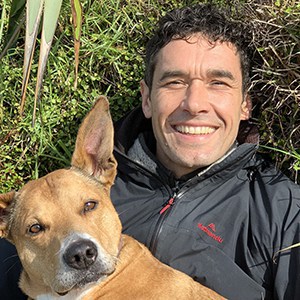

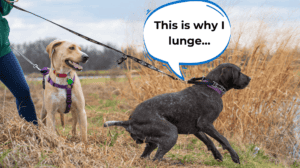

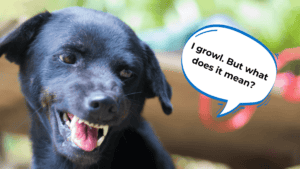


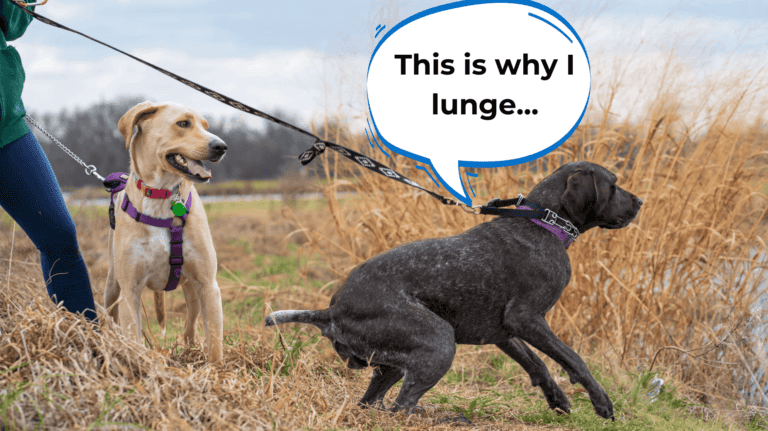

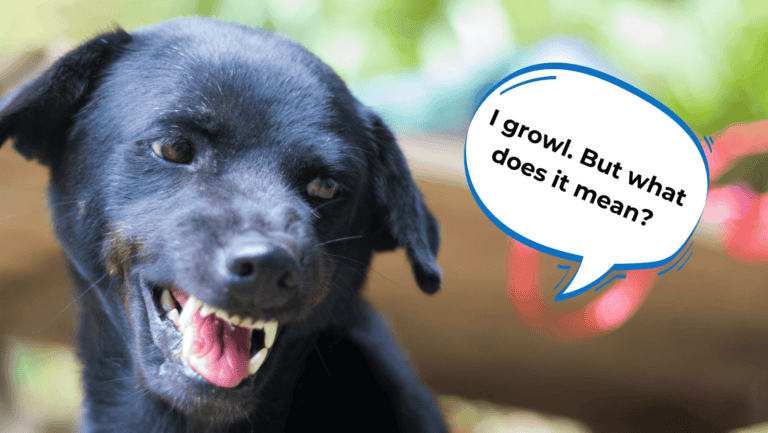

1 Response
What do you think of Vital Essentials Purely Raw that is freeze dried Chicken nibs. Made of chicken, chicken heart, chicken liver, herring oil, mixed tocopherols Vitamin E supplement iron amino acid, chelate, Ind amino acid chelate, manganese amino acid chelate, copper amino acid chelate. Our dog also has dried duck lungs. She absolutely loves the food!! She also eats the beef brand. She was a picky eater, could go a day or so wihtout eating. She now eats a 1/4 cup twice a day as she is a 10 lb Schnoodle. She is happy, calmer and can’t wait to eat!